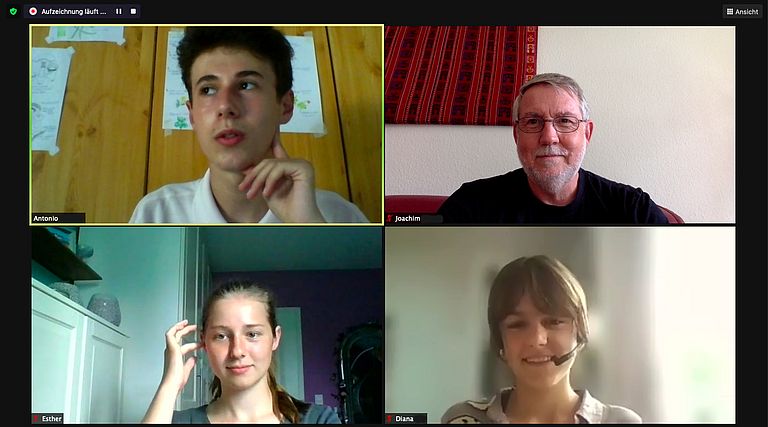Summer-Science-Camp … at Home
High school students from three countries discover the oceans together virtually
Associations with the words “summer school” usually include fun and excitement in a mix of classes, outdoor activities and maybe barbecues at open fires during warm evenings. In the case of Ocean@Home, a 2-week virtual summer school organized by several marine research institutions and NGOs in Germany, Poland and Romania, in times of COVID-19 this was replaced by screen-sharing, breakout groups and internet research instead.
21 high school students between 14 and 17 years from these countries applied for and participated in the course from 12 to 23 July to learn about different aspects of ocean and climate sciences as well as environmental sustainability. The program consisted of presentations by experts from the research institutions, group work for the students and individual assignments that tried to deflect part of the action away from the computer screen: “On one day, the task was to go to a beach or playground and collect plastic garbage in a specified area”, reports Diana (14) from Poland. “It was analysed and the results were recorded in a protocol to compare them with the rest of the team.” Esther (17) from Germany adds: “And on another day we went to supermarkets in our regions to find out where different seafood products come from. In fact, the first supermarket I went to, they did not want to let me check the labels of the products, so I had to go to a different one.”
While this may not sound like the average notion of “fun”, the participants seemed to have a good time, nevertheless. Diana: “Everything is in English, and sometimes this is hard to understand, but we are working together and exchanging information; it’s so cool!” And Antonio (16) from Romania adds: “Besides the work, we also have cultural exchange. We go ‘hey, Romanians are like this and Germans are like that…’ and I really think that friendships will come out of this.” Esther: “First I was not so sure if we would be able to talk about these stereotypes, but everybody is open-minded and it is possible to make jokes, so it is great fun to compare these things.”
So, wasn’t anybody sceptical about this concept of an online-summer-school? “Yes, of course! We all were”, says Dr. Joachim Dengg from GEOMAR Kiel, one of the organizers of Ocean@Home. “We had been planning this school for half a year, but we had no idea if anybody would even want to participate, and if they did, if they would enjoy it.” What about the students? “I really liked the ocean and environmental topic, but when I saw that it was just online, I had doubts at first, but I was also curious how it would work”, Esther says with some hesitation. “We had online classes in school before and there it was often very … well … quiet, but here people interact. It works pretty fine, and I think it was the right decision to apply.”
Every second day of the online course, the students worked on their own and examined individual targets of the United Nations’ Sustainable Development Goals related to oceans and climate. “We discussed what the specific problem is and what each of us can do to help solve it”, Antonio points out, and Esther adds: “It is very interesting because there are so many more ideas in the group than I would have thought of alone.”
In summary, would they all do it again? Diana’s answer pretty much says it all: “Yes, I would really like to join a summer school like this again. I am getting to know new people, practicing my English and learning really interesting facts about the environment and our planet. But, of course, it would even be better if we could meet face to face.”
Ocean@Home was organized by the GEOMAR Helmholtz-Institute of Ocean Research Kiel, Germany; IOPAN – Institute for Oceanology, Polish Academy of Sciences, Sopot, Poland; Alfred Wegener Institute, Helmholtz Centre for Polar and Marine Research, Helgoland, Germany; Today We Have, Sopot, Poland; and Mare Nostrum, Constanța, Romania. The summer school was supported by the German Polish Youth Office GPYO in the framework of its programme Experiment Austausch / Eksperyment Wymiana.
Contact:
Dr. Joachim Dengg, Phone: +49-431-600-4006, jdengg(at)geomar.de



